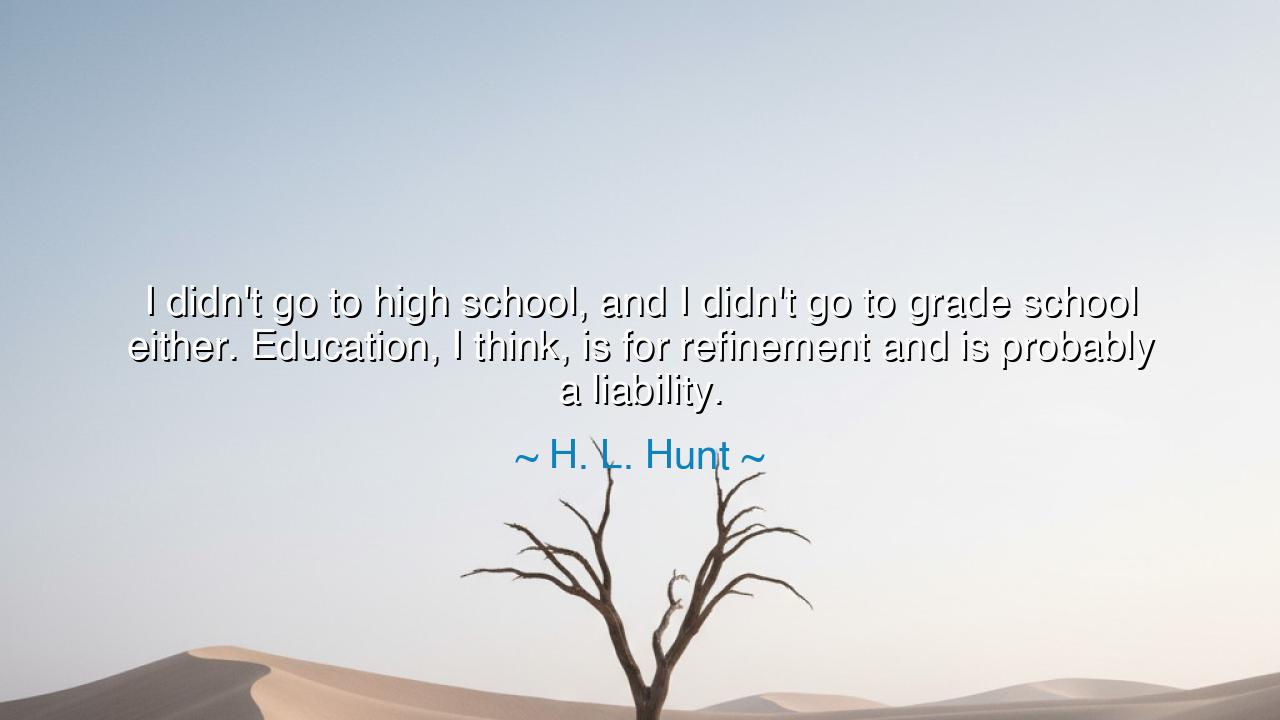
I didn't go to high school, and I didn't go to grade school
I didn't go to high school, and I didn't go to grade school either. Education, I think, is for refinement and is probably a liability.






The American oil magnate H. L. Hunt, one of the most daring entrepreneurs of the twentieth century, once declared: “I didn’t go to high school, and I didn’t go to grade school either. Education, I think, is for refinement and is probably a liability.” At first glance, his words seem to strike against the sacred value of education, yet beneath them lies a deeper and more provocative truth. Hunt was not scorning learning itself, but challenging the kind of learning that tames the spirit and dulls the fire of ambition. He spoke as a man forged not in classrooms, but in struggle — a man who believed that the greatest teacher of all is life itself.
Hunt’s life was a testament to this conviction. Born to poverty in the 1880s, he received almost no formal schooling, yet he went on to become one of the wealthiest men in the world through oil, risk, and relentless will. His words spring not from ignorance, but from experience — from the conviction that education without action, or intellect without instinct, can be as much a burden as a blessing. When he called education “a liability,” he was speaking of those who mistake refinement for strength, who polish their manners but never sharpen their resolve. He believed that too much reliance on formal systems of thought could stifle the raw creativity, daring, and independence that drive great achievement.
To understand his meaning, one must remember that Hunt belonged to a generation of self-made men, forged in the crucible of frontier America. It was an age when success was earned not through degrees, but through vision and courage. To such men, the world was not a lecture hall but a proving ground. They learned from hardship, from failure, from the land itself. In this spirit, Hunt’s view echoes the ancient idea that wisdom and experience are greater than the mere accumulation of facts. The Stoic philosophers, too, warned that knowledge without virtue or courage is useless — that the true measure of a man lies not in what he knows, but in what he can do.
Consider the life of Thomas Edison, who, like Hunt, received almost no formal education. Expelled from school as “difficult,” Edison learned by observation, experimentation, and tireless curiosity. He failed thousands of times before perfecting the electric light — yet from those failures he built the foundation of the modern world. Had he waited for instruction, he might never have dared to invent. For men like Edison and Hunt, education of the conventional sort was too narrow, too timid. They sought a living education, drawn from the world’s endless challenges and opportunities — the kind of learning that demands courage, persistence, and the will to rise after every fall.
And yet, Hunt’s statement is not a rejection of intellect, but a warning against dependence. Education, he says, is “for refinement” — meaning it polishes the mind, gives it structure and order, but does not necessarily create greatness. Refinement without hunger leads to complacency. A man too polished may become cautious, hesitant to act for fear of imperfection. Hunt saw that those who rely solely on formal training may lose the daring that true success requires. The mind must be disciplined, but the spirit must remain wild. It is the fire of instinct — not the comfort of certainty — that opens new worlds.
There is also a moral undercurrent to Hunt’s words. He believed that greatness is not inherited through privilege or learned from books, but earned through toil. His life reminds us that education is not confined to schools — it is found in every decision, every loss, every struggle. The farmer learns from the soil, the sailor from the storm, the merchant from his failures. In this broader sense, Hunt’s philosophy aligns with the wisdom of the ancients: that life itself is the greatest teacher, and adversity the most faithful master.
But the lesson we must take from H. L. Hunt’s quote is not to despise education, but to transcend it. Let the mind be educated, yes — but let it not become a cage. Let knowledge refine you, but never imprison your instincts or courage. True learning is not obedience to the known, but the courage to explore the unknown. The one who clings to the safety of lessons will forever walk in the footsteps of others; the one who dares to act without the promise of certainty will blaze trails for generations.
So, my friends, remember this: books may open the mind, but only experience awakens the soul. Seek knowledge not for vanity, but for mastery; not for titles, but for truth. For as H. L. Hunt understood, the finest education is the one written in the language of life itself — learned through sweat, failure, faith, and the indomitable will to rise. Let your refinement come not from the classroom alone, but from the battlefield of existence, where courage and wisdom are forged together in the fire of destiny.






AAdministratorAdministrator
Welcome, honored guests. Please leave a comment, we will respond soon